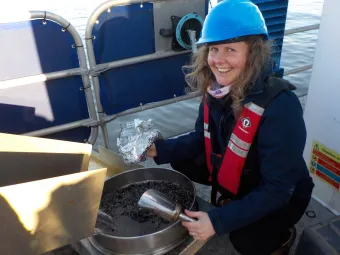
The visible effects of plastic entering the ocean are unfortunately all too clear to us. But what happens to it under the surface? And what is the impact on delicate ocean ecosystems?
We recently caught up with Anthropogenic Contaminants Scientist Dr Alice Horton on her fascinating role in cutting-edge research to understand the distribution and transport of plastics to and within our ocean, and their effects on ecosystems.
What is your role in research at NOC?
My research focuses on anthropogenic contaminants: pollutants in the environment derived from human activities. My expertise lies especially in microplastics; understanding how these get into the environment, how they behave, where they end up, and what their ecological effects are along the way. I both lead and participate in projects broadly working across land, rivers and the ocean, with a key focus on river-to-sea microplastic transport and interactions.
What drew you to working in this area?
I have always been interested in science, especially biology and environmental science, and the impacts that humans can have on the natural environment. During my undergraduate and Master’s degrees my research projects were focused on the effects of both increased temperatures and metal pollution on jellyfish survival and reproduction. I soon realised that environmental stressors, especially pollution, have the capacity to have huge impacts on ecosystems, and the problem is only going to get worse!
When a job opportunity came up to research microplastics and toxic pollutants at the UK Centre for Ecology and Hydrology (UKCEH) in 2014 I jumped at the chance to research this pollutant that was hardly known about. Since then, plastics research has exploded and I have had the opportunity to be at the forefront of that, which has been really exciting. While at UKCEH I completed a part-time PhD and then started my job as an Anthropogenic Contaminants Scientist at NOC in 2019.
What science are you currently working on?
I am currently working within two large Europe-wide projects a) investigating the seasonal flows and abundance of microplastics in major European rivers and the North Sea (LabPlas project) and b) understanding and mapping Atlantic Ocean ecosystems, with a key focus on understanding the distribution of plastics and their associated microbial communities (AtlantECO project).
Within the LabPlas project specifically, along with my colleagues, I am collecting and analysing samples from the River Thames, all the way from the freshwater part through to the estuary, to understand how the amounts of microplastics vary by location and throughout the year in water, sediment, fish, invertebrates and the surrounding air. This will help us to understand how the River Thames delivers microplastics to the North Sea.
In the AtlantECO project, my colleagues and I are analysing particles captured from 3000 m depth (using stationary ‘sediment traps’ which collect sinking particles) to assess how the amount of microplastics might correlate with other sinking material such as organic carbon, and how this varies across different years. This will give us a better understanding of when and why microplastics end up in the deep sea.
I am also supervising PhD students who are investigating microplastics in the Arctic, and the presence and ecotoxicity of water-soluble polymers (often found in cosmetics).
What is your favourite thing about the work you do?
I love the fact that every day is different, I am always learning, and I never get bored! My job might take me from writing a paper at my desk, collecting samples from a boat on the River Thames in Central London, in the lab analysing samples, talking to politicians in parliament, presenting my work at international conferences, to demonstrating at schools and science fairs, and much more in between.
I find it really motivating to work in a field of research that has such high societal relevance and visibility. Scientific research can be difficult and there are definitely challenges, for example when equipment fails or techniques don’t work, but this widespread interest in my work helps me stay inspired.
What impact does your science have on society?
Alongside climate change, plastics are recognised as one of the greatest environmental challenges of our time. My research into which plastics are the most abundant and hazardous in the environment can help to inform policy and businesses towards making better long-term decisions for the way we use and manage plastics into the future.
I also enjoy sharing my knowledge with the general public to empower them to make changes around their own behaviours, for example buying fewer or different products, or putting pressure on MPs to tackle the plastics problem. It is not the responsibility of one sector in society to address this issue but if everybody makes a small difference, this can create a big change. I hope my research and engagement helps people to understand where they fit in and the difference they can make, either as an individual or as a huge corporate industry.
Learn more about the plastics research at NOC
Join the NOC Ocean Alliance
If you or your organisation would like to find out more about supporting our endeavours, contact us at giving@noc.ac.uk. A gift allows you to have a direct impact on world leading ocean research and innovation, and helps ensure NOC continues to make global impact from the coast to the deepest ocean. Whatever your passion – combating climate change, conserving and protecting ocean life, or equipping the next generation of marine scientists, you can donate here.